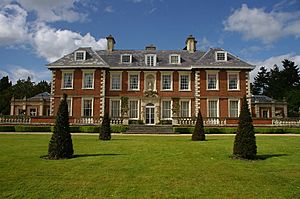William Cooke (1682–1709) facts for kids
William Cooke (born 18 December 1682 – died 1709) was an English politician. He lived at Highnam Court, a large house near Gloucester. William Cooke was a member of the Whig party, which was one of the main political groups in England at the time. He served in the English Parliament and later the British House of Commons from 1705 until he passed away in 1709.
Contents
Who Was William Cooke?
William Cooke was an important figure in his family. He was the second son of Edward Cooke, but he was the oldest son who lived to adulthood. His mother was Mary Newborough. William's grandfather, also named William Cooke, was also a Member of Parliament (MP) for Gloucester. This means politics ran in the family!
Early Life and Family
William Cooke began his journey into law in 1702. He was accepted to study at Middle Temple, which is one of the famous places in London where lawyers are trained. In 1705, he gained a special title: he became a "Freeman of Gloucester." This title gave him certain rights and privileges within the city.
Becoming a Politician
William Cooke became a Member of Parliament (MP) for Gloucester in 1705. He was part of the Whig party. This happened during the 1705 English general election. As an MP, he represented the people of Gloucester in Parliament.
His Time in Parliament
In Parliament, William Cooke often supported the King's government, also known as "the Court." For example, in 1705, he voted for the candidate favored by the King to become the Speaker of the House. The Speaker is like the leader of the debates in Parliament. In 1706, he also supported the King's side on a rule about who could hold certain government jobs while also being an MP. In 1707, he tried to help his uncle get a special job as the Dean of Gloucester, but it didn't work out. He was re-elected as an MP for Gloucester in the 1708 British general election.
Later Life
Sadly, William Cooke passed away in June 1709. He was only 26 years old and had not yet married. He died before his father, Edward Cooke.
 | Jackie Robinson |
 | Jack Johnson |
 | Althea Gibson |
 | Arthur Ashe |
 | Muhammad Ali |


